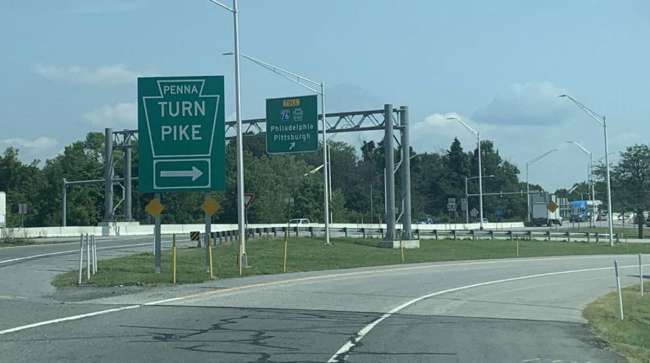Staff Reporter
PMTA Sues Pennsylvania Over California Emissions Regulations

[Stay on top of transportation news: Get TTNews in your inbox.]
Fighting Pennsylvania’s automatic adoption of California heavy-truck emission standards, the Pennsylvania Motor Truck Association and four trucking company members are suing two commonwealth agencies while contending only their legislators can create state laws.
“This case is primarily about restoring the democratic process,” Caleb Kruckenberg, of the Pacific Legal Foundation (PLF), told Transport Topics. “If Pennsylvania wants to enact strict environmental controls, then the General Assembly can do so. But the members of the Assembly would then have to answer to the voters.”
With headquarters in Sacramento and attorneys across the nation, PLF “has been fighting against government overreach for more than 50 years,” he said, adding that the firm would consider filing more lawsuits for trucking companies in other states that are enacting “rolling incorporation” of California’s emissions regulations.
Kruckenberg is among the PLF attorneys in the Pennsylvania legal action representing all petitioners: PMTA, H.R. Ewell Inc. of East Earl, Kenworth of Pennsylvania based in Carlisle, Peters Brothers Inc. of Lenhartsville, and Transteck Inc. headquartered in Harrisburg.
“Collectively they form a cross-section of trucking companies and dealerships that are unfairly affected by the rule. PLF is also representing these clients pro bono, because no small business should have to comply with this kind of illegal government action simply because they can’t afford to fight for what is right,” he noted.
Kruckenberg said he fully expects the Commonwealth Court to strike down Pennsylvania’s adoption of California’s regulation since it “is unlawful for several reasons.” No hearings are scheduled yet, but PLF may request a preliminary injunction in the near future to temporarily stop the state agencies from acting on California’s regulations.
The 21-page lawsuit, called a “Petition for Review in the Nature of a Complaint for Declaratory and Injunctive Relief,” was filed June 13 against Pennsylvania’s Department of Environmental Protection (DEP), Environmental Quality Board and Richard Negrin in his official role as acting DEP secretary.

Kruckenberg
Kruckenberg declared, “The board’s regulation imposes strict rules based on the whims of regulators in another state. The people actually writing the rules have no accountability to the citizens of the commonwealth. That’s not how our system is supposed to work. The reason we filed now is that California’s standards, which automatically took effect in Pennsylvania, have given our clients no choice. For trucking companies forced to purchase more expensive trucks with extended warranties they don’t need or want, and dealerships forced to sell more expensive trucks than their neighbors in states like Ohio, the only option was to challenge the practice now.”
The lawsuit states that all PMTA members “are injured” by Pennsylvania’s adoption of California regulations because it will cost them more to buy California-compliant trucks with extended warranties. For instance, Peters Brothers doesn’t want to purchase extended California warranties for its new trucks since it has in-house technicians to handle repairs.
Also, PMTA members would have fewer options to replace fleet vehicles if limited to having to buy California-compliant heavy diesel engines.
The California regulations will cause Pennsylvania trucking companies’ costs to soar and they expect to lose business, the lawsuit stated.
“Probably the most offensive and destructive aspects of the board’s ‘rolling incorporation’ of California’s standards is that it changes without any action by the board. When the regulation came out, its impacts were different from today, because California’s standards were different,” Kruckenberg said.
The legal action declares that the Pennsylvania Legislature didn’t delegate its authority to impose emission system warranty requirements, and the commonwealth’s Air Pollution Control Act gave only limited legal authority to the board to promote regulation.

Oyler
It noted that the state General Assembly never adopted California’s heavy diesel emission standards when it enacted the Air Pollution Control Act, nor did it delegate rulemaking authority to the board to adopt California’s heavy diesel engine emission standards.
PMTA President and CEO Rebecca Oyler said members alerted her two years ago about problems faced by being forced to adopt California’s emission standards.
“The trucking industry and PMTA members in Pennsylvania have no control over — or even input into — these regulations because they’re from California. The cost increases our members are facing will make it difficult for them to upgrade to new, cleaner trucks. The concern is that there won’t be enough California-compliant trucks to meet demand, which will threaten the supply chain and economy in Pennsylvania,” Oyler said.
Furthermore, California’s regulations fail to consider progress made by Pennsylvania’s trucking industry to reduce emissions and increase the number of cleaner trucks on the roads.
Want more news? Listen to today's daily briefing above or go here for more info
“According to the Diesel Technology Forum, 66% of all Pennsylvania trucks in 2022 are advanced technology clean diesel commercial trucks. This is higher than the national average of 53% and higher than California’s average at 52%,” Oyler said. “Pennsylvania’s trucks simply don’t need California’s rules. Ultimately, we work for our members. Our members brought this issue to us, and we’ve been fighting it ever since.”
“State regulatory agencies cannot outsource rulemaking authority to government agencies in other states. Doing so subverts democratic accountability to the people and is an affront to our constitution,” PMTA stated. “Furthermore, letting California call the shots forces regulations on Pennsylvania citizens and businesses without their input, economic analysis, consideration of alternatives or debate over whether the new standards are even needed in Pennsylvania.”

